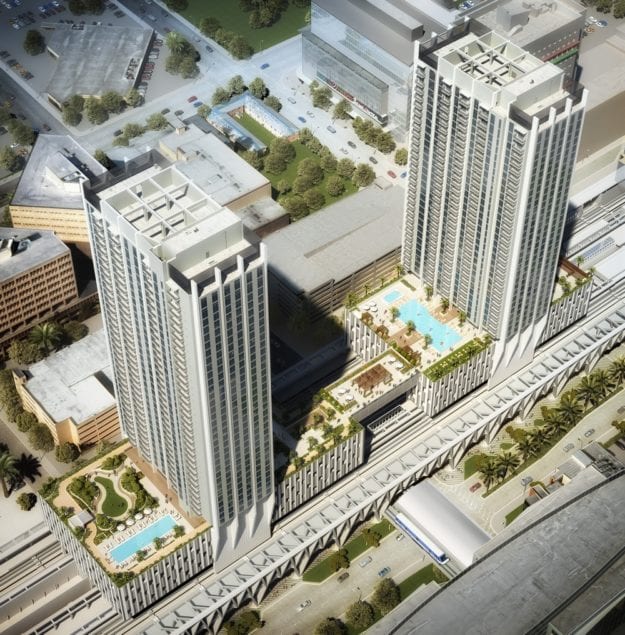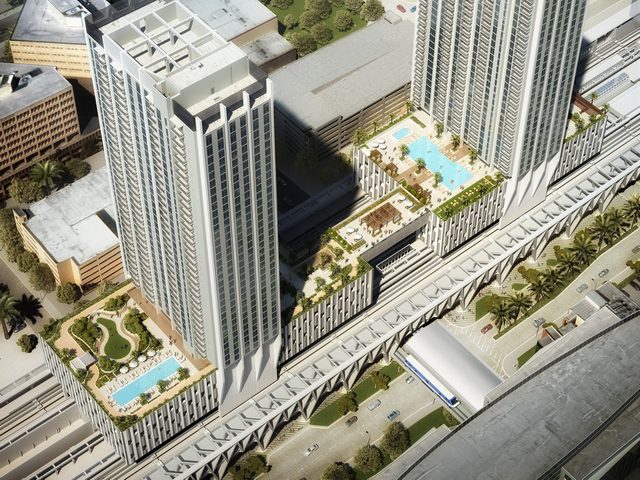
Florida East Coast Industries (FECI) recently announced its new real estate brand Park-Line, offering residences for lease with unparalleled connectivity in urban locations.
Debuting in 2018 with a 290-unit tower in downtown West Palm Beach, followed by two towers with a total of 816 units at MiamiCentral in 2019, the Park-Line brand is an integral part of FECI’s dynamic, transit oriented developments transforming South Florida.
“Park-Line residences are designed for people on the move who want to live and travel smarter,” said Daniel Quintana, vice president of development for Florida East Coast Industries. “Each of the innovative towers in West Palm Beach and Miami will expand residents’ playground and working options by utilizing a vast variety of transit options just steps away from their front door, including our new Brightline train service that will seamlessly connect Miami, Fort Lauderdale and West Palm Beach.”
Partnering with Lincoln Property Company, among the most respected and diversified names in residential real estate services, Florida East Coast Industries will bring the Park-Line experience to life. Park-Line properties will feature multi-family residences for lease including studio, one and two-bedroom apartments in West Palm Beach and studios, one, two- and three-bedroom apartments within MiamiCentral.
Every residence will be highlighted by floor-to-ceiling windows, classic designer finishes and a collection of unparalleled amenities.
Amenities making Park-Line one of the most sought after addresses for today’s professional seeking a modern urban living experience include: a full-service poolside lounge; open-air cross training course; yoga lawn and fitness center with juice bar; private cabanas with outdoor grills and intimate seating areas; shaded dog parks and pet grooming salon; event lawn with movie screen and full social calendar of resident events.
Also, at the unique MiamiCentral location, residents will benefit from 180,000 square feet of retail space including Miami’s first true food hall experience, Central Fare. Adding to the mixed-use environment, MiamiCentral’s 300,000 square feet of office space will offer office employees the option for a live, work, play lifestyle.
“Lincoln Property Company is always seeking opportunities to raise the bar on multi-family living residences and this collaboration with Brightline is a glimpse into the future,” said Chuck Shallat, executive vice president of Lincoln Property Company’s Southeast Region. “We look forward to welcoming our first Park-Line residents in 2018 and offering two of the most innovative addresses in South Florida.”
The Park-Line residences will be located within steps of the Brightline express intercity train service connecting Miami, Fort Lauderdale and West Palm Beach with new downtown stations, a fleet of innovative trains and a complete customer-centric operating and communication offering that redefines what it means to travel by train in America.
MiamiCentral is an 11-acre, transit-oriented mixed-use development spanning over six city blocks in the heart of downtown Miami from Florida East Coast Industries, one of the oldest leading real estate and infrastructure developers in Florida.
The project’s initial phase features 300,000-plus square feet of Class A office space; 180,000-plus square feet of innovative retail and dining experiences including Central Fare, Miami’s first true food hall experience; 800 smartly designed residential rental units; and the home of Brightline, redefining train travel in the United States.
For more information, visit the website at www.miamicentral.com.






Hopefully this doesn’t surprise anybody. While stupid NIMBYs fight the Brightline trains, which are a great idea (as is Tri-Rail using the FEC line), nobody else I’ve observed seems to have noticed that the rail project was promoting real estate development in a contemporary version of what Flagler did. Big money, such as private equity firms, loves real estate nowadays. The trains, at least, may eventually be sold to governments (state and SE Florida) independently of the stations (with whose revenues the leadership is more likely to retain). The modern version is: Use new trains to develop prime real estate, then sell the trains.
These new places in Miami remind me of those huge residential dumps in Shanghai.